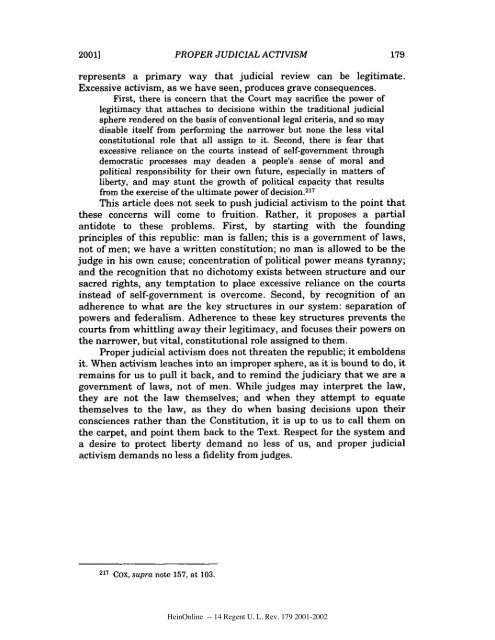Judicial ReEngineering
Judicial ReEngineering
Judicial ReEngineering
You also want an ePaper? Increase the reach of your titles
YUMPU automatically turns print PDFs into web optimized ePapers that Google loves.
20011<br />
PROPER JUDICIAL ACTIVISM<br />
represents a primary way that judicial review can be legitimate.<br />
Excessive activism, as we have seen, produces grave consequences.<br />
First, there is concern that the Court may sacrifice the power of<br />
legitimacy that attaches to decisions within the traditional judicial<br />
sphere rendered on the basis of conventional legal criteria, and so may<br />
disable itself from performing the narrower but none the less vital<br />
constitutional role that all assign to it. Second, there is fear that<br />
excessive reliance on the courts instead of self-government through<br />
democratic processes may deaden a people's sense of moral and<br />
political responsibility for their own future, especially in matters of<br />
liberty, and may stunt the growth of political capacity that results<br />
from the exercise of the ultimate power of decision. 217<br />
This article does not seek to push judicial activism to the point that<br />
these concerns will come to fruition. Rather, it proposes a partial<br />
antidote to these problems. First, by starting with the founding<br />
principles of this republic: man is fallen; this is a government of laws,<br />
not of men; we have a written constitution; no man is allowed to be the<br />
judge in his own cause; concentration of political power means tyranny;<br />
and the recognition that no dichotomy exists between structure and our<br />
sacred rights, any temptation to place excessive reliance on the courts<br />
instead of self-government is overcome. Second, by recognition of an<br />
adherence to what are the key structures in our system: separation of<br />
powers and federalism. Adherence to these key structures prevents the<br />
courts from whittling away their legitimacy, and focuses their powers on<br />
the narrower, but vital, constitutional role assigned to them.<br />
Proper judicial activism does not threaten the republic; it emboldens<br />
it. When activism leaches into an improper sphere, as it is bound to do, it<br />
remains for us to pull it back, and to remind the judiciary that we are a<br />
government of laws, not of men. While judges may interpret the law,<br />
they are not the law themselves; and when they attempt to equate<br />
themselves to the law, as they do when basing decisions upon their<br />
consciences rather than the Constitution, it is up to us to call them on<br />
the carpet, and point them back to the Text. Respect for the system and<br />
a desire to protect liberty demand no less of us, and proper judicial<br />
activism demands no less a fidelity from judges.<br />
217 COX, supra note 157, at 103.<br />
HeinOnline -- 14 Regent U. L. Rev. 179 2001-2002

















